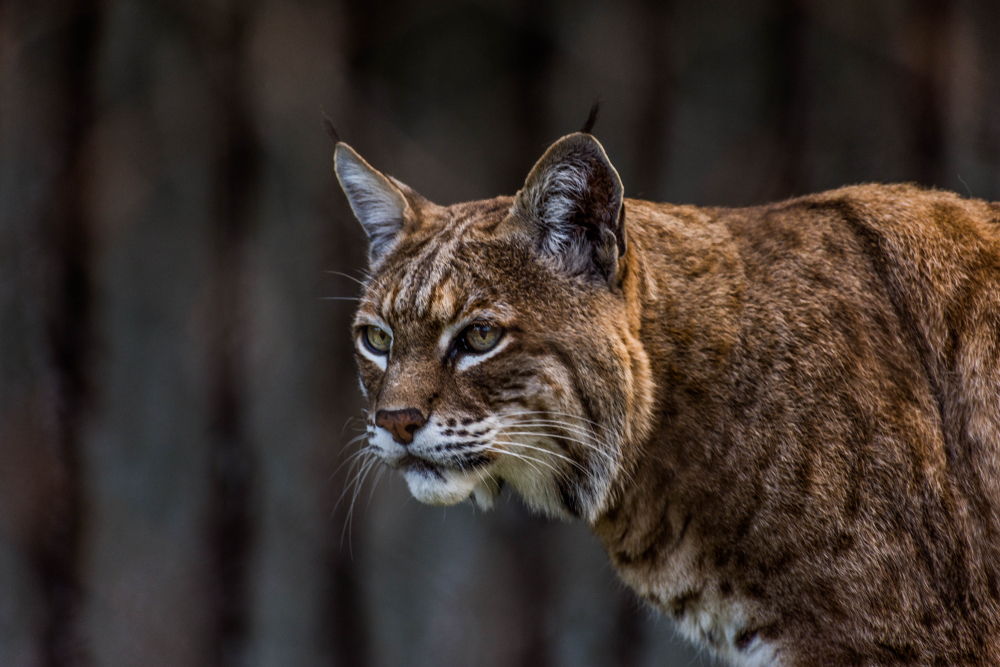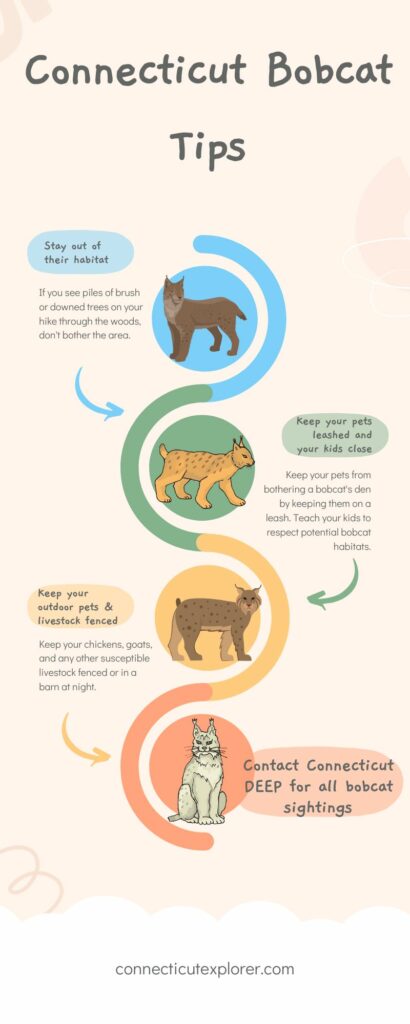Within a month of moving to CT, I looked out on my back porch to see a giant wild cat standing on my favorite chair. Not being native to the state, I freaked out – what was it? A mountain lion? A lynx? That led me to research if there are bobcats in Connecticut.
The research led me to the answer – yes, there are bobcats in Connecticut. The state has a healthy population of bobcats, in fact.
As a parent of young children, though, I needed more answers.
Where do bobcats live in CT, how big do they get here, and what should I do if I encounter one while outdoors?
My quest for answers led me to a wealth of information – and I’m happy to share that knowledge with you right here.
So, let’s get right to it.

Where do bobcats live in CT?
Bobcats generally choose habitats that provide lots of cover and plenty of prey. This makes forests the perfect habitats for bobcats.
Compared to the 25% of the land that was covered in forest in the late 1800s, around 60% of the state is currently classified as forest land.
Though bobcats are sometimes spotted in urban areas, it’s not common.
If you live near one of Connecticut’s 110 state parks or 32 massive state forests, you’re more likely to come across a bobcat than someone who lives in Hartford or New Haven proper.
This explains why I was able to spot a bobcat right on my property. My house was essentially on the outskirts of Hopemead State Park.
A very rural area.
How big do bobcats get in CT?
Bobcats are one of CT’s top predators, which might cause people to be concerned about their size.
Though bobcats in CT have been found to kill deer and large wild turkeys, they generally stick to smaller prey.
In CT, male bobcats generally weigh between 18 and 35 lbs and can measure up to 37″ in length, and females are a bit smaller, weighing only as much as 30 lbs and measuring up to 32″ in length.
Have there been bobcat attacks in Connecticut?
Bobcat attacks are rare, but there have been several occurrences of bobcats attacking humans in Connecticut.
In 2019, a 12-year-old boy was attacked by a bobcat that wandered into his yard. The boy was lefts with a torn shirt and a minor scratch on his finger from the incident.
Earlier that year, a bobcat attacked a man on a golf course. It’s suspected that the same bobcat attacked a horse in the same area just several hours earlier.
Bobcats can carry rabies, though, and more recently, in 2021, a couple was attacked by a rabid bobcat, leaving them with more serious injuries.
What happens if you see a bobcat in CT?
Bobcats are nocturnal animals, and they generally like to keep to themselves, so it’s highly unlikely that you’ll come across one on your weekend hike.
If you’re still concerned about bobcat encounters, the best thing to do is arm yourself with information and learn how to protect your pets and young kids.
Here are some tips:
- Downed trees, abandoned sheds, and brush piles make great dens for vulnerable bobcat kittens. Avoid walking through these areas in the woods, especially during spring, when mother bobcats are birthing and caring for their kittens.
- Clear your yard of potential bobcat dens. (check to see if the den is empty first)
- Keeps your pets leashed while outside.
- Keep livestock fenced or enclosed.
- Like any other wild animal, give them space. Don’t approach a bobcat.
- Bobcats are the most active just after dusk. Keep your pets and kids inside during this time.
Connecticut’s Department of Energy and Environmental Protection (DEEP) tracks the state’s population of bobcats.
If you spot a bobcat like I did, just hanging out on your back porch, you need to report it on this bobcat sighting form, which goes straight to DEEP.
If you come across a bobcat that has been hit and killed by a car, the number to call is 1-860-424-3011.

So, now you’ve got the information about bobcats in CT. Make good choices when you come across a potential bobcat den, keep your pets leashed and your kids close, and be mindful of when they’re most active and you’ll likely never have a bad encounter.